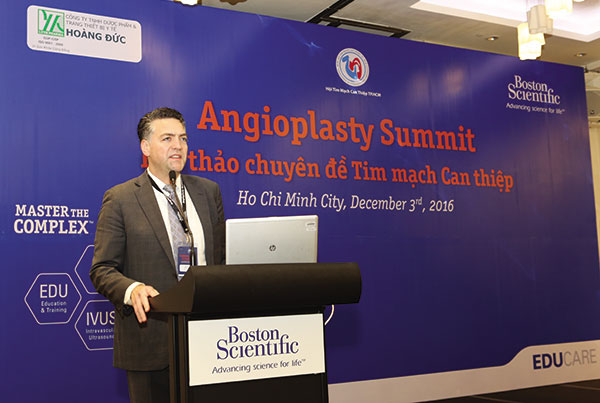Boston Scientific’s vision advances cardiology care
 |
| Dr. Craig Thompson, chief medical officer of Interventional Cardiology at Boston Scientific presented the company's latest technology at The National Angioplasty Summit |
The summit was held for Vietnamese interventional cardiologists, by Boston Scientific’s distributor Hoang Duc, to discuss key interventional cardiology trends and the application of minimally invasive technologies to treat cardiovascular diseases.
According to the Vietnam Heart Association’s statistics, one in every three Vietnamese adults is at risk of getting cardiovascular disease, and they are mainly related to coronary artery diseases. One in every four deaths in Vietnam each year is caused by coronary heart disease. In 2016, there have been 18-20,000 new cases of coronary artery diseases, a number which rises 5 to 10 per cent per year.
The Vietnamese interventional cardiology field started in 1997 at Bach Mai Hospital in Hanoi, and witnessed rapid growth thereafter with centres sprouting up in Ho Chi Minh City and Hue. Today, nearly 50 interventional cardiology centres have been established nationwide. The field has made major strides, coming from a strictly diagnostic expertise to advanced association branches with modern techniques. However, the overuse and misuse of technology in practice has caused unexpected consequences for patients. This challenge presents a distinct need for innovative technology to provide life-saving therapies to the Vietnamese market.
Over 200 physicians, government officials, and industry experts attended the summit. They heard presentations on a wide range of topics, including demographic trends in cardiac diseases in Vietnam, the evolution of interventional cardiology, and the latest medical treatments and stents available, such as bioabsorbable polymer stents.
The summit is part of Boston Scientific’s efforts to train Vietnamese medical specialists on their technologies, particularly in complex procedures. One of Boston Scientific’s central goals is preparing the local healthcare system to treat diseases that afflict the ageing population, such as complex coronary artery disease and structural heart diseases, with the latest medical solutions.
For over 35 years, Boston Scientific has transformed lives through innovative medical solutions. In interventional cardiology, Boston Scientific is a market leader in providing minimally-invasive technologies for diagnosing and treating a variety of structural heart and vascular conditions. Boston Scientific set up its Vietnam representative office in Ho Chi Minh City in August 2015. The firm has a portfolio of over 300 medical devices in Vietnam, which include stents and all necessary adjunctive devices for angioplasty – including advanced equipment like intravascular ultrasound machines (IVUS) and rotational atherectomy systems, which are used to allow accurate diagnosis of the disease and to remove calcium from the vessel wall to facilitate a good outcome. Other products – for treatment of peripheral vascular diseases, gastrointestinal disease, and urology disease – are also available in Vietnam.
At the summit, Boston Scientific also introduced its latest SYNERGY stent, approved by the US Food and Drug Administration (FDA) for the treatment of coronary artery disease. It is the first and only stent providing synchronised drug and polymer absorption. The stent is designed to enable more rapid and complete arterial healing, and to thereby reduce the risk of complications associated with long-term polymer exposure, compared to currently-used drug-eluting stents (DES) with permanent polymers.
Craig Thompson, chief medical officer of Interventional Cardiology at Boston Scientific, said, “The introduction of the first bioabsorbable polymer stent in the US is a tremendous milestone in the evolution of stent technology. This next generation therapy is designed to improve patient outcomes and has been made possible by our partnership with physicians from around the world.”
Vo Thanh Nhan, chairman of the Ho Chi Minh City Angioplasty Association, said, “The summit provides access to physicians in Vietnam to learn more about such innovative medical solutions from all over the world. They can be trained in these technologies, especially for niche, complex procedures. Meanwhile, Vietnamese patients can benefit from these treatments, which can improve their health with less trauma and lower risk of complications.”
What the stars mean:
★ Poor ★ ★ Promising ★★★ Good ★★★★ Very good ★★★★★ Exceptional
Latest News
More News
- State corporations poised to drive 2026 growth (February 03, 2026 | 13:58)
- Why high-tech talent will define Vietnam’s growth (February 02, 2026 | 10:47)
- FMCG resilience amid varying storms (February 02, 2026 | 10:00)
- Customs reforms strengthen business confidence, support trade growth (February 01, 2026 | 08:20)
- Vietnam and US to launch sixth trade negotiation round (January 30, 2026 | 15:19)
- Digital publishing emerges as key growth driver in Vietnam (January 30, 2026 | 10:59)
- EVN signs key contract for Tri An hydropower expansion (January 30, 2026 | 10:57)
- Vietnam to lead trade growth in ASEAN (January 29, 2026 | 15:08)
- Carlsberg Vietnam delivers Lunar New Year support in central region (January 28, 2026 | 17:19)
- TikTok penalised $35,000 in Vietnam for consumer protection violations (January 28, 2026 | 17:15)
















 Mobile Version
Mobile Version